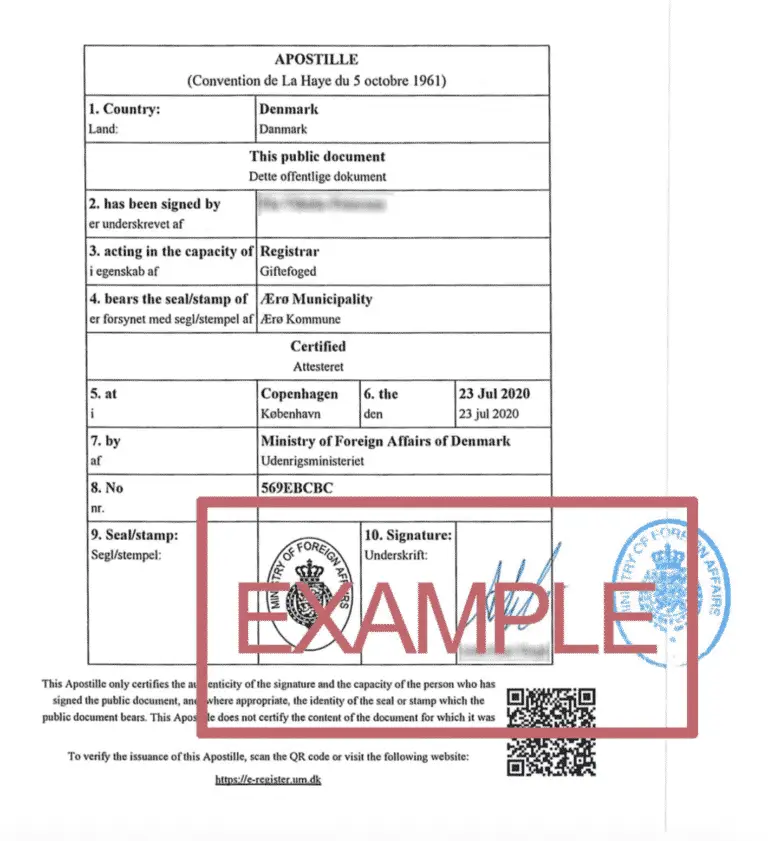Listen to this article
If you’re getting married in Denmark, the chances are that at some point you’ll need to prove your marital status or provide legal evidence of your marriage in another country. This can be done with a Danish Apostille legalisation, a certificate that verifies that your marriage certificate is official and genuine.
Danish-issued wedding certificates can be legalised for use abroad with a Hague Apostille.
This is because Denmark is one of the Hague Convention countries, which follow the simplified registered Apostille process of the Hague Convention.
If you’re not quite sure whether or not this affects you or simply want to know how to get an Apostille, Denmark’s procedure for this is fortunately relatively simple.
This guide will tell you what you need to know about Hague Apostille Legalisation, Denmark’s status for issuing an Apostille legalisation, and cover some common questions about it too.
FAQs about Hague Apostille Legalisation in Denmark
Yes, absolutely.
We specialise in every aspect of helping couples to get married in Denmark, and can also take care of legalising your marriage certificate with the Hague Apostille Legalisation.
Danish wedding ceremonies provide you with your international wedding certificates, but it is common for international couples to have these legalised for use elsewhere too, as it varies if your local government wish for it to be legalised or not.
You can choose our Apostille Service as a stand alone service Here
Or contact us if you have any further questions.
Lots of couples ask why they need an apostille, Denmark being a country whose wedding ceremonies are recognised as legal across the world.
While everyone has a basic understanding of the meaning of “legalisation,” what the word means in the specific context of your wedding certificate is rather different.
After your civil wedding ceremony in Denmark, you are legally married, both in Denmark and everywhere else too! You receive a formal legal document to prove this, which is your Danish wedding certificate.
But if you use your Danish wedding certificate in another country, it will be viewed as a foreign document and so, it needs to be converted into the appropriate format to be accepted under that other country’s laws.
This means that a standard Danish wedding certificate is – for administrative purposes – only usable within Denmark itself. In other Hague Convention Countries, you may need your wedding certificate legalised with the Hague Apostille Legalisation.
Denmark is a Hague Convention country, and this means that documents legalised in Denmark can be used in any other Hague Convention country too.
When we talk about legalising your wedding certificate, this doesn’t mean making something legal for the first time; it just means adding the Hague Apostille so that your certificate is recognised as legal outside of Denmark too.
Apostille legalisation is the only document you’ll need to prove your marriage within countries that are a part of the Hague Apostille Convention.
You can see a full list of Hague Apostille Convention countries here.
However, for countries who are not part of the Hague Apostille Convention, there might be other, different processes and legal procedures in place for authenticating wedding certificates, and so we recommend you check with the relevant office or department in the country in question to find out what they need.
You may also be able to find this information out from the embassy in Denmark of the country in question, as this is usually a fairly common query to international embassies.
Unfortunately not.
Only the country you were married in can issue your Hague Apostille Legalisation. Denmark-issued wedding certificates need to be converted into an apostille here in Denmark; this is another reason why it is a good idea to get your legalisation done before you go home, even if you may not need it upfront.
Apostille legalisation has to be performed in the country where the original marriage certificate originated, so if you got married in Denmark, the apostille has to be legalised in Denmark too.
There are currently 118 countries within the Hague Apostille Convention, representing most first-world countries, and a significant number of developing nations as well.
For a full, up-to-date list of countries that are signatories of the Hague Apostille Convention, please see here.
What is the Hague Apostille Convention?
The Hague Apostille Convention is an international treaty made between Hague Apostille Convention countries.
It is an agreement on how a document issued in any one of the Convention’s member countries can be certified as suitable for legal recognition in any of the other member countries.
Once issued for use across the other Hague Apostille Convention countries, the document in question is what we call the Apostille

What Countries are Part of the Hague Apostille Convention?
There are currently 125 members within the Hague Apostille Convention, representing most first-world countries, and a significant number of developing nations as well.
For a full, up-to-date list of apostille countries in 2023 that are signatories of (or will soon be joining) the Hague Apostille Convention, please see here:
| Albania |
| Andorra |
| Antiqua and Barbuda |
| Argentina |
| Armenia |
| Australia |
| Austria |
| Azerbaijan |
| Bahamas |
| Bahrain |
| Barbados |
| Belarus |
| Belgium |
| Belize |
| Bolivia |
| Bosnia and Herzegovina |
| Botswana |
| Brazil |
| Brunei Darussalam |
| Bulgaria |
| Burundi |
| Cape Verde |
| Chile |
| China (Hong Kong) |
| China (Macao) |
| Colombia |
| Cook Islands |
| Costa Rica |
| Croatia |
| Cyprus |
| Czech Republic |
| Denmark |
| Dominica |
| Dominican Republic |
| Ecuador |
| El Salvador |
| Estonia |
| Fiji |
| Finland |
| France |
| Georgia |
| Germany |
| Greece |
| Granada |
| Guatemala |
| Honduras |
| Hong Kong |
| Hungary |
| Iceland |
| India |
| Ireland |
| Israel |
| Italy |
| Japan |
| Kazakhstan |
| Korea |
| Kosovo |
| Republic of Kyrgyzstan |
| Latvia |
| Lesotho |
| Liberia |
| Liechtenstein |
| Lithuania |
| Luxembourg |
| Macao (China) |
| Macedonia (FYR of) |
| Malawi |
| Malta |
| Marshall Islands |
| Mauritius |
| Mexico |
| Monaco |
| Mongolia |
| Montenegro |
| Morocco |
| Namibia |
| Netherlands |
| New Zealand |
| Nicaragua |
| Niue |
| Norway |
| Oman |
| Panama |
| Paraguay |
| Peru |
| Philippines |
| Poland |
| Portugal |
| Republic of Moldova |
| Russian Federation |
| Saint Kitts and Nevis |
| Saint Lucia |
| Saint Vincent and the Grenadines |
| Samoa |
| San Marino |
| Sao Tome and Principe |
| Serbia |
| Seychelles |
| Slovakia |
| Slovenia |
| South Africa |
| Spain |
| Suriname |
| Swaziland |
| Sweden |
| Switzerland |
| Tajikistan |
| The former Yugoslav Republic of Macedonia |
| Tonga |
| Trinidad and Tobago |
| Tunisia |
| Turkey |
| Ukraine |
| United Kingdom of Great Britain and Northern Ireland (UK) |
| Uruguay |
| United States of America (USA) |
| Uzbekistan |
| Vanuatu |
| Venezuela |
Where does the name “Apostille” come from?
The word “Apostille” is derived from an old French word meaning “annotation,” which translates as “note or explanation.”
This in turn, comes from the Latin word “Postilla.” Postilla means “afterword, next or thereafter,” reflecting the same original meaning as the French “Apostille” itself.
What is a Hague Convention?
A Hague Convention is an international treaty developed and adopted by the Hague Conference. There are multiple Hague Conventions, and a full list of them can be found on the Hague Conference website, under the heading of “Conventions.”
The Apostille Convention is the 12th Hague Convention (including the Statute of the Hague Conference).
What is the Hague Conference?
The Hague Conference is an international, intergovernmental organisation that works in the field of private international law, and which serves to agree and administer a number of international conventions and protocols across all of its member countries.
Hague Conventions are made and agreed by the Hague Conference, which is convened in sessions and takes the form of an international organisation serving the interests of its members.
How Can I Get my Danish Wedding Certificate Legalised?
Getting Married in Denmark can take care of Apostille legalisation on your behalf, and we recommend that all of the couples that we help ask us to do this.
However, we can also help you if you got married in Denmark in the past and didn’t get an Apostille at the time.
Learn more about our Apostille Legalisation Service
Denmark’s process for this is relatively simple, and you will generally get your documents back and ready to use quite quickly; but it is always wise to take care of the process well in advance!
Feel free to get in touch if you need further information on Apostilles in general, or have any more questions we can help with, without obligation.



